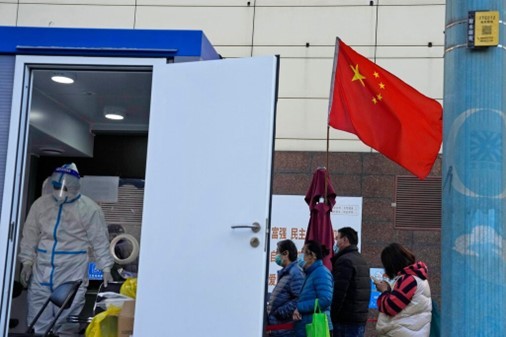
HONG KONG: Foreign investors are pulling the plug on China and Hong Kong-listed stocks despite a recent rally, but their mainland counterparts are betting on a sharp rebound driven by easing Covid curbs.
Underscoring the sharp divide, international investors sold 68.5 billion yuan (US$9.45 billion) worth of shares in the two months to the end of October, with the selling keeping pace in November, according to market data. So far this year, global investors have withdrawn a net 9.6 billion yuan from Chinese stocks, in a marked reversal of net capital injections during previous years.
The outflows, via a trading link between the mainland and Hong Kong, have taken a bite out of major companies including China Merchants Bank and liquor producer Kweichow Moutai.
International investors, who sold 18.7 billion yuan of Shanghai-listed Kweichow Moutai in the past three months, fear the company will suffer under President Xi Jinping’s common prosperity campaign, which aims to narrow China’s growing wealth gap.
The shares are down nearly 30% since January as investors bet that demand for popular spirit baijiu will suffer under government policies and as the Chinese economy heads for its weakest performance in decades owing to strict Covid-19 controls and a global slowdown.
Kweichow Moutai, seen as a symbol of wealth, is going to “face a huge headwind” under the income-gap drive, said Stevan Tam, a Hong Kong-based research director at Fulbright Securities, adding that the heavy selling showed “foreigners lost their confidence and patience” in the Chinese market.
Despite a sharp rally over the past week, Hong Kong’s Hang Seng Index is still down about 30% since January while Shanghai’s SSE Composite Index is off 16% over the same period.
Mainland investors are wagering that China will soon loosen its controversial virus policies, which rely on lockdowns and mass testing to quash even small outbreaks. The country is battling a fresh surge of infections that has prompted new movement restrictions in southern manufacturing hub Guangzhou.
Chinese shareholders have plugged some 37 billion Hong Kong dollars (US$4.71 billion) into the offshore market with tech and entertainment Group Tencent standing out as the biggest winner, drawing some HK$36.8 billion in the past three months. Pharmaceutical company WuXi Biologics also got a bump from the buying.
So far this year, Chinese buyers have poured HK$363.86 billion into Hong Kong-listed stocks through the trading link, even as the Hang Seng Tech Index is down some 40% on the year and China’s major technology groups contend with the weakening economy and a government crackdown on the sector.
Aries Zheng, a Beijing-based investor, said he put about 300,000 yuan into Hong Kong stocks last month via two Chinese mutual funds focused on health care and tech, adding to his portfolio of some 3 million yuan worth of stocks listed in the financial hub.
“Hong Kong shares of the same companies are much cheaper than the mainland shares,” Zheng said, adding that he saw China as a safer bet than some international markets.
Beijing has maintained its strict virus policies, but some investors are betting a relaxation is almost certain and hope to book short-term gains on the rumours, said Thomas Fung, Hong Kong-based CIO for China Rise Securities Asset Management.
A conference on Saturday put on by China’s disease prevention and control agency hinted at a possible loosening of the zero-Covid policy, some global banks have said.
“The conference’s emphasis on implementation could lead to some de facto easing – Covid prevention is often overdone at the local level instead of following the protocol,” Citi said in a market analysis this week, referring to the “science based” control measures that Beijing has touted.
Meanwhile, German Chancellor Olaf Scholz’s visit to China last week and expectations that Beijing will greenlight the use of the BioNTech mRNA Covid vaccines for foreign residents of the mainland are “encouraging news and policy signs on reopening”, Goldman Sachs said.
A reopening could spark a 20% jump in Chinese stocks, amounting to a US$2.6 trillion equity market injection, Goldman said, adding that it forecasts China will start reopening in the second quarter of next year. But the market could see a 15% decline “in a no or delayed-reopening scenario,” it warned.
Source: https://www.freemalaysiatoday.com/category/business/2022/11/10/foreign-investors-flee-chinas-market-as-recovery-hopes-fade/

